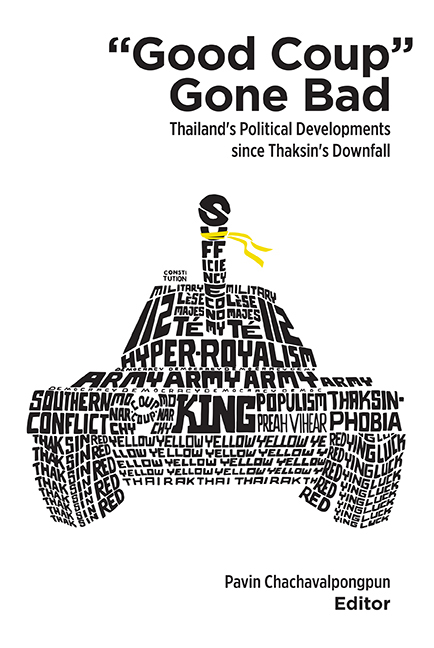Book contents
- Frontmatter
- Contents
- List of Tables and Figures
- Foreword
- Contributors
- Abbreviations
- Section I The 2006 Military Coup: Impact on the Thai Political Landscape
- Section II Defending the Old Political Consensus: The Military and the Monarchy
- Section III New Political Discourses and the Emergence of Yellows and Reds
- Section IV Crises of Legitimacy
- 9 Reaping the Whirlwind: Thailand's Coup and the Southern Problem
- 10 From Marketplace Back to Battlefield: Thai-Cambodian Relations in the Age of a Militarized Politics
- Index
- Plate Section
9 - Reaping the Whirlwind: Thailand's Coup and the Southern Problem
from Section IV - Crises of Legitimacy
Published online by Cambridge University Press: 21 October 2015
- Frontmatter
- Contents
- List of Tables and Figures
- Foreword
- Contributors
- Abbreviations
- Section I The 2006 Military Coup: Impact on the Thai Political Landscape
- Section II Defending the Old Political Consensus: The Military and the Monarchy
- Section III New Political Discourses and the Emergence of Yellows and Reds
- Section IV Crises of Legitimacy
- 9 Reaping the Whirlwind: Thailand's Coup and the Southern Problem
- 10 From Marketplace Back to Battlefield: Thai-Cambodian Relations in the Age of a Militarized Politics
- Index
- Plate Section
Summary
In early November 2006, some six weeks after Thailand's coup, the juntaappointed interim Prime Minister, Surayud Chulanont, travelled to the embattled southern border provinces to address officials and community leaders. His speech on 8 November in Pattani Province was made famous by his so-called “apology” to southern Muslims for the State's previous mistakes in combating the violence. Surayud's presentation is notable for another reason. He began by speaking of two crises that faced his administration, namely: the national crisis of discord that had purportedly justified the coup against former Prime Minister Thaksin Shinawatra (though he was not named in the speech), and the southern strife. But Surayud made no attempt to link these national problems in “causal” terms. Was there any relationship between Thailand's coup of September 2006 and the southern unrest, whether in terms of cause or effects? Though by 2006 the insurgent-driven violence in Thailand's southern border provinces had become a serious national issue demanding a comprehensive government-led resolution, the “Southern Fire” actually played no role in provoking the military coup. The coup was an act staged by leading military factions supported by a conservative power elite and an urban middle class dedicated to removing Thaksin from power and eliminating his party's control over the Thai state apparatus. It was an issue of the “centre”, and the south was conspicuously “marginal” to the key motivations and legitimating claims of the coup makers. The anti-Thaksin coup saw a reconfiguration in (and a reassertion of) the balance of power between key centres of conservative political influence in the country. It elevated to leadership the military elite and unelected representatives of the monarchy, who from 2006 to 2007 proceeded to sponsor a range of allied anti-Thaksin groups in an effort to re-engineer the country's legal framework to ensure the election of an anti-Thaksin post-coup parliament (a project which failed).
- Type
- Chapter
- Information
- Good Coup Gone BadThailand's Political Development since Thaksin's Downfall, pp. 219 - 252Publisher: ISEAS–Yusof Ishak InstitutePrint publication year: 2014



